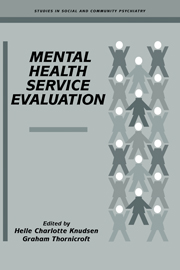Book contents
- Frontmatter
- Contents
- List of contributors
- Foreword
- Preface
- Part I INTRODUCTION
- Part II COMPREHENSIVE SERVICE EVALUATION PROJECTS
- Part III METHODS: MEASUREMENT, STRATEGIES AND NEW APPROACHES
- Part IV SYSTEM-LEVEL RESEARCH
- Part V PROGRAMME-LEVEL RESEARCH
- 16 Randomised controlled trials of programmes
- 17 Individual patient outcomes
- 18 Caregiving in severe mental illness: conceptualisation and measurement
- 19 Needs assessment
- Part VI HEALTH ECONOMICS IN MENTAL HEALTH
- Index
17 - Individual patient outcomes
from Part V - PROGRAMME-LEVEL RESEARCH
Published online by Cambridge University Press: 05 August 2016
- Frontmatter
- Contents
- List of contributors
- Foreword
- Preface
- Part I INTRODUCTION
- Part II COMPREHENSIVE SERVICE EVALUATION PROJECTS
- Part III METHODS: MEASUREMENT, STRATEGIES AND NEW APPROACHES
- Part IV SYSTEM-LEVEL RESEARCH
- Part V PROGRAMME-LEVEL RESEARCH
- 16 Randomised controlled trials of programmes
- 17 Individual patient outcomes
- 18 Caregiving in severe mental illness: conceptualisation and measurement
- 19 Needs assessment
- Part VI HEALTH ECONOMICS IN MENTAL HEALTH
- Index
Summary
Introduction
Already in 1958 the World Health Organization (WHO), in a declaration extended recently, stated that:
Health is a state of complete physical, mental and social wellbeing and not merely the absence of disease and infirmity. (WHO, 1958, 1985)
In fact, an individual's illness is usually dramatically characterised by feelings of discomfort, or perceptions of change in usual functioning, which are not necessarily correlated with clinical signs and symptoms. A correct evaluation of health should be based on how the patient feels, on his or her individual judgement, in addition to clinical signs or symptoms. Moreover, in chronic illnesses treatments should be evaluated mainly in terms of whether they are more or less likely to lead to an outcome of a life worth living in social and psychological, as well as physical, terms.
The WHO concept of health implicitly defines the efficacy of an intervention as its ability to bring an individual to a condition of complete or partial wellbeing, and clearly emphasises: (1) social functioning as a complement of the clinical signs; (2) the comprehensiveness and the multidimensionality of the enquiry; (3) the subjectivity of the evaluation. The model for outcome evaluation proposed by the WHO is a complex one, far from the simple, symptom-based model that clinicians frequently have in mind when evaluating outcome. If such a complex approach seems to provide extremely important information in all medical disciplines, it becomes absolutely necessary in psychiatry. Among others, Schulberg & Bromet in 1981 individuated issues and strategies for the measurement of outcome which raise problems currently unsolved and stated that:
Outcome studies should be sophisticated if they are to be valid and useful to programme planning.
(Schulberg & Bromet, 1981)Referring to, and extending, their statements, outcome studies should aim to answer the following questions: Which intervention is efficacious? On what parameters? According to whom? In which subjects? Under which conditions?
Evaluation of outcome has been neglected in psychiatry. The lack of knowledge on the efficacy of psychiatric interventions has been outlined recently by various authors (Wright et al., 1989; Jenkins, 1990; Mirin & Namerow, 1991; Attkisson etaL, 1992).
- Type
- Chapter
- Information
- Mental Health Service Evaluation , pp. 281 - 295Publisher: Cambridge University PressPrint publication year: 1996
- 15
- Cited by



